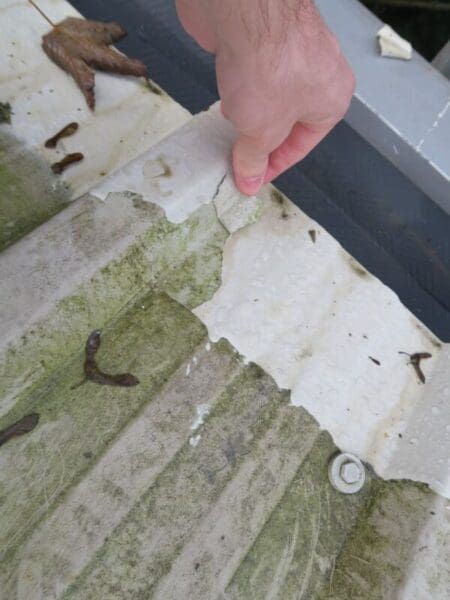Common Installation Mistakes
Whether you are treating cut edge corrosion surface preparation is probably the most important aspect of the job.
There is always a temptation for site operatives to take short cuts and it’s usually at the cleaning and preparation stage where these short cuts take place, simply because cleaning and preparation is time-consuming.
Occasionally, as manufacturers, we receive calls from project managers and clients stating that their new cut edge corrosion treatment or coating is failing. The suggestion here is that something is wrong with the coating.
However, the reality is that something has happened during installation that is causing problems in getting the new coating to stick to the roof.
In the images below, we examine some of the causes for coating adhesion failure. We can’t think of a single instance where the coating itself has been responsible for an adhesion failure, but here are some common reasons that cause problems;
- Applying the coating onto dirty surfaces
- Applying the coating to wet or damp surfaces (even microscopic moisture can cause failures)
- Insufficient film thickness – all coatings need to be applied at a minimum film thickness as this is what gives them their strength
- Incompatible material being used – anything that’s not supplied by the manufacturer can cause issues. Coatings are chemicals!
- Environmental conditions – humidity, fog and dew can adversely affect coatings
- Untrained personnel installing unfamiliar products
- Temperature – too hot or too cold will affect curing times and adherence
- Incomplete preparation
Because corrosion is already present on the cut edges, cleaning alone isn’t enough when treating cut edge corrosion. It is vital to prepare the cut edges back to bare metal. This means completely removing all existing finishes or treatments that might be present.
This level of preparation needs to extend at least 25mm beyond the highest point of corrosion so that the primer coat can be applied fully to the bare metal sheet ends, without leaving any untreated areas or exposed high spots. All sections of the edge of the roof sheet need to be prepared, so this includes the crowns (the top of the profile), the webs (the vertical parts of the profile) and the troughs (the bottom part of the profile).
Additionally, the area above the cut edge corrosion being treated should be cleaned using a solvent wipe or other cleaning method. The cleaned area should extend at least 100mm above the prepared areas, onto the existing finish. This allows for the new top coat to extend onto the existing finish of the roof, so it’s important that the existing finish is clean.
Even after the cut edges are cleaned and/or primed, they will probably still require cleaning using a solvent wipe. This removes surface grease and any post-cleaning/priming soiling. It is easy to disregard this step, but it’s one that causes most problems when treating cut edge corrosion.
We don’t want to over complicate coatings, but in order to have a successful installation, it is really important to get the preparation right.
Shortcuts cost money.


